| GENOME UNRAVELED | |
June 26, 2000 |
|

|
Experts discuss the future of genetic research and how it could change medicine, after a background report. The Health Unit is a partnership with the Henry J. Kaiser Family Foundation. |
|
Mr. Rennie, how would you describe the importance of today's announcement? JOHN RENNIE: This is certainly one of the greatest announcements of science in any of our lifetimes, easily comparable to landing on the Moon, to the Manhattan Project. It's a colossal achievement of science and... JIM LEHRER: We have; can you hear me, Mr. Rennie? We can't hear you, at least I can't hear you. Let me go to Dr. Lifton and we'll come back to you, I promise. Dr. Lifton, you heard what I asked Mr. Rennie just now. What words would you use to describe the significance of this? DR. RICHARD LIFTON: This is really a remarkable achievement. This promises to transform the way we think not just about medicine but about the very nature of who we are as human beings. JIM LEHRER: Explain that. How does this change what we are as human beings and how could this do that?
JIM LEHRER: Well, make the connection in simple terms, if you could, doctor. Between all of those letters and that Susan Dentzer just showed us and what you just said, how do you get from those letters to that kind of information? DR. RICHARD LIFTON: Well, unfortunately we can't do that today. But what we've been provided is the blue print. So if I could make an analogy, perhaps where we've been up until today in understanding human biology is much like where Christopher Columbus was when he set off to the New World. We didn't know how big the world -- we didn't how many continents there were, we didn't know what their shape was or how they were distributed. But once we knew what the overall map looked like we could chart in detail how to get from one place to another, and we understood that it was in fact a bounded problem, that figuring out that the world was really focused on one single map. Well, that's what we've achieved today with the sequencing of the human genome -- is we now understand what all of the pieces are. And what remains is a tremendous amount of work for the future, which will require us to figure out in precise detail how those subtle differences in the a's, g's, t's and c's, lead to differences as profound as giving us opposable thumbs or brains that are capable of consciousness. JIM LEHRER: And Mr. Rennie, you're back now. JOHN RENNIE: Yes, thank you. |
 |
||||||||||||||||||
| Medical breakthroughs | ||||||||||||||||||||
|
JIM LEHRER: So carry on from what Dr. Lifton was just saying, as to why that is significant to know all these things. How does that lead to great practical breakthroughs in medicine and elsewhere?
JIM LEHRER: Manipulate them for good. I mean the assumption is that all the manipulation will be for good, is that right?
JIM LEHRER: That's what eugenics is. JOHN RENNIE: That's right. JIM LEHRER: You want everybody blue eyed or whatever, you can have a child made to order kind of thing, right? JOHN RENNIE: Exactly. Exactly. And of course the most horrific specter of eugenics was of course what we think of with the Nazis. So of course as we're moving into a sort of new genomic era, there's always the potential for making similar kinds of horrifying decisions. But it may well be that we don't have to worry so much about what the governments may be imposing on people, but actually what kinds of decisions we may be making at a consumer level. And let me actually be a tougher set of ethical dilemmas to solve. JIM LEHRER: In other words, it's a society problem and eventually a political problem as much as it's going to be a scientific problem? JOHN RENNIE: Exactly. That's why the sorts of legislation that are being discussed for genetic prejudices - it's good that that's being considered again. JIM LEHRER: Dr. Lifton, would you agree that suddenly as of today that science is way ahead of the rest of society in knowing what to do about all this? |
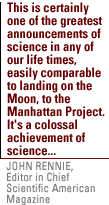 |
|||||||||||||||||||
| Ethics of genetic research | ||||||||||||||||||||
|
JIM LEHRER: Doctor, let me go back just to one specific from a scientific area. Cancer, that awful word, that awful disease has been thrown around rather loosely since this genetic genome project began, that this might provide an answer to cancer. Explain how that might be possible. DR. RICHARD LIFTON: Yes. Virtually every human disease including cancer has an inherited susceptibility, and we can recognize that simply from looking at our own families and seeing the particular diseases such as cancer or heart disease, run in families. So what we mean by that is that there's an inherited susceptibility that ultimately must be encoded in those A's, g's, C's and T's We know that, as President Clinton said, the DNA sequence between any two individuals is 99.9% identical to one another. So out of the 3 billion base pairs, there are only about 3 million common variants that would distinguish the entire genomes of any two individuals. So we recognize that the inherited susceptibility to disease must lie in those relatively subtle variations in genes. So having this overall blueprint of the human genome, we will in short order be able to identify what all of the genes are within that DNA, within our genomes, and from that we'll be able to identify what the common variants are. And then it will really be like putting together a puzzle, figuring out which of these variants contribute to the inherited component of every disease. This is going to have a remarkable impact on every field of medicine. JIM LEHRER: Mr. Rennie, is that work already begun? Are there researchers now going through his letters? And saying that may be the gene that says cancer is lying ahead? |
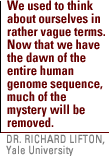 |
|||||||||||||||||||
| Work already underway | ||||||||||||||||||||
| JOHN RENNIE: Absolutely. This sort of work has been going
on for quite some time. The emphasis on the idea of completing this portion
of the genome project has in some ways overshadowed the fact that people
have been working with the genetic information over years, and developing
some understanding of, let's say, the rudiments of the genetic basis of
disease. So we've already seen quite a bit of work going on in developing
new sorts of tests and narrowing down the types of new drugs that we could
develop. We're just going to see a huge acceleration in all that work
moving forward.
JIM LEHRER: Back to the potential good versus the potential bad, I read somewhere today that somebody said think of this in terms of the atomic bomb in a way. It caused terrible tragedy of course when it was used, but the whole thing of nuclear power that came out of that, it's the same kind of dilemma? JOHN RENNIE: I think that's a very fair comparison to make. We have so much potential for good that we can do with this genetic information. We really can change the nature of how sick people are; we can change the opportunities that are available for people. This can create whole new industries. And yet at the same time we have to watch out that we're not accidentally fallen prey to our own worst instincts. JIM LEHRER: Dr. Lifton, what would you use in terms of past history to compare this with? DR. RICHARD LIFTON: Well, I would characterize -- this as quite similar, the feeling is similar to when I had as a young boy watching the first Moon landing. This is really a remarkable event and I think great cause for scientific celebration. JIM LEHRER: All right. Dr. Lifton and Mr. Rennie, thank you both very much. |
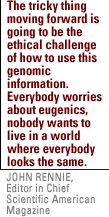 |
|||||||||||||||||||
 JIM
LEHRER: More now on the meaning of today's announcement from Dr. Rick
Lifton, chairman of the genetics department at Yale University, and
John Rennie, editor-in-chief of Scientific American magazine.
JIM
LEHRER: More now on the meaning of today's announcement from Dr. Rick
Lifton, chairman of the genetics department at Yale University, and
John Rennie, editor-in-chief of Scientific American magazine. DR.
RICHARD LIFTON: Well, so we now, we used to think about ourselves in
rather vague terms. Now that we have the dawn of the entire human genome
sequence, much of the mystery will be removed. And from that perspective,
the opportunity to understand why we have the particular features that
we do, ranging from our height and weight to our susceptibility to different
diseases will now become very possible. Moreover, the opportunity to
understand why we are different from other species, why do we have opposable
thumbs or why do we think the way we do and why is that different from
even closely related species will become possible to understand.
DR.
RICHARD LIFTON: Well, so we now, we used to think about ourselves in
rather vague terms. Now that we have the dawn of the entire human genome
sequence, much of the mystery will be removed. And from that perspective,
the opportunity to understand why we have the particular features that
we do, ranging from our height and weight to our susceptibility to different
diseases will now become very possible. Moreover, the opportunity to
understand why we are different from other species, why do we have opposable
thumbs or why do we think the way we do and why is that different from
even closely related species will become possible to understand. 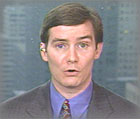 JOHN
RENNIE: Well, the essence of what the genome project has done is, it's
literally spelled out the genetic information of how to make a human
being. Francis Collins has sometimes described the genome as basically
being the instruction book for human being. And that's really what we
have here. We now have a much better idea of how to make up the basic
components of our cells and our whole bodies. Our genes are what give
us the traits that we have, as the doctor was saying, our height, our
weight in some ways, our coloration. But also some of our more interesting
features of what make us healthy or what make us sick. So now that we
have a more detailed genetic information about this, we also maybe have
a much better understanding of how to manipulate those factors.
JOHN
RENNIE: Well, the essence of what the genome project has done is, it's
literally spelled out the genetic information of how to make a human
being. Francis Collins has sometimes described the genome as basically
being the instruction book for human being. And that's really what we
have here. We now have a much better idea of how to make up the basic
components of our cells and our whole bodies. Our genes are what give
us the traits that we have, as the doctor was saying, our height, our
weight in some ways, our coloration. But also some of our more interesting
features of what make us healthy or what make us sick. So now that we
have a more detailed genetic information about this, we also maybe have
a much better understanding of how to manipulate those factors.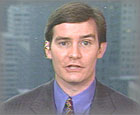 JOHN
RENNIE: That's what we have to hope is the case. Naturally everybody
will be against the evil manipulations of this. The tricky thing moving
forward is going to be the ethical challenge of how to use this genomic
information. Everybody worries about eugenics, nobody wants to live
in a world where everybody looks the same.
JOHN
RENNIE: That's what we have to hope is the case. Naturally everybody
will be against the evil manipulations of this. The tricky thing moving
forward is going to be the ethical challenge of how to use this genomic
information. Everybody worries about eugenics, nobody wants to live
in a world where everybody looks the same.